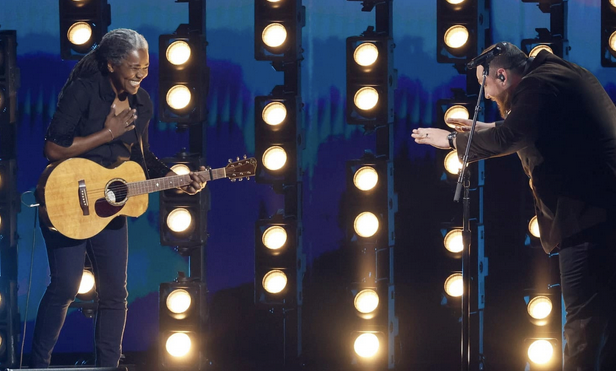Talkin’ ‘Bout A Love Revolution

I was a young adult when “Fast Car” came out. From the moment I heard it, it felt like one of those songs that had always existed; the kind of melody you can’t imagine living without. The life Tracy Chapman describes in the lyrics didn’t match mine in its details, but the longing for something better, feeling trapped in cycles of systemic harm and dreaming of a way out? I felt that deep in my bones.
Almost forty years later, it’s easy to see why so many young folks are rediscovering the song and pushing it to the top of the charts. For a generation buried under student debt—for whom “stability” can feel at best like a pipe dream or a cruel joke at worst—the blend of wistfulness, anger and acceptance strikes a resonant chord. And the inequality that Chapman describes in 1988 certainly hasn’t disappeared—racism continues to fester, haunting fresh lives with longstanding generational curses. “Maybe together we can get somewhere. Any place is better, starting from zero got nothing to lose,” hits hard when the average wealth of a Black family of four is $24,000—just 12% of their white counterparts.
Meanwhile, those structural injustices have been matched by an increasingly violent culture war. For four weeks last year, the #1 Billboard single featured Jason Aldean’s grotesque longing to lynch someone in a small town—and the music video’s use of Black Lives Matter protest footage made it crystal clear who he imagined lynching. The unending physical violence—from the murders of George Floyd, Breonna Taylor and Ahmaud Arbery to Kyle Rittenhouse hunting protestors—combined with the incessant psychic violence on social media has left this country both devastated and utterly exhausted. So I wasn’t surprised by the overwhelming response to Tracy Chapman and Luke Combs’ Grammy performance. People are starved for connection—reminders of our fundamental unity.
Honestly, the performance was stunning. From the moment she stepped on that stage and beamed before the adoring crowd, Tracy Chapman was radiant. No special effects—not even an in-ear monitor—she let the power of her lyrics speak for themselves; a melody every bit as powerful as it was when she released it. I didn’t know Luke Combs before last night, but what I saw impressed me deeply. While she sang, he gazed at her with such obvious admiration, such fervent respect. Every choice he made centered her: She played guitar, he didn’t. She sang first, and last. At points, he simply mouthed the words beside her, seemingly awed just to share the stage. And, in doing so, he elevated his own performance. He showed the world the clear difference between appropriation and appreciation.
When they sang together, you could hear the harmony that should define this country’s relationships across race. God Herself was present in that sonic revolution: To paraphrase a different Chapman song, it sounded like the divine whisper.
And yet, if we do not uproot the white supremacy tearing this country apart, that glorious performance is just a pretty moment—glimmers of a better life that the narrator herself catches before being plunged back into suffering. “I know things will get better,” she sings, “You’ll find work and I’ll get promoted, and we’ll move out of the shelter, buy a bigger house and live in the suburbs.” The hopefulness of those lines is made all the more devastating in the final verse when she concedes, “I’d always hoped for better, thought maybe together you and me would find it. But I got no plans ain’t goin’ nowhere, take your fast car and keep on driving.”
Every time I hear that song, my body aches in the middle verse because I know where it’s headed: “Still gotta make a decision,” she sings plaintively, “Leave tonight or live and die this way.” As a woman in her sixties who has seen America promise to change again and again—who has seen so many sparks of beauty and life beyond the ubiquitous violence—I must confess: I’m fearful this will simply be another interlude before we again return to this country’s foundational white supremacy.
Still, art has a way of pointing us beyond ourselves—transcending fear and anxiety to show us not as we are but as we might become. For five resplendent minutes that evening, a Black queer woman shared space with a white country star, and their intertwining voices captivated the country. Perhaps this is not an interlude, but a seed that will blossom in a thousand unexpected ways. An opportunity for the millions of us who yearn for something better to find it in solidarity, in shared commitment to birthing a new nation. After all, we have an advantage over “Fast Car’s” narrator: We don’t yet know how our story ends.
Visit Jaqui’s website here.
